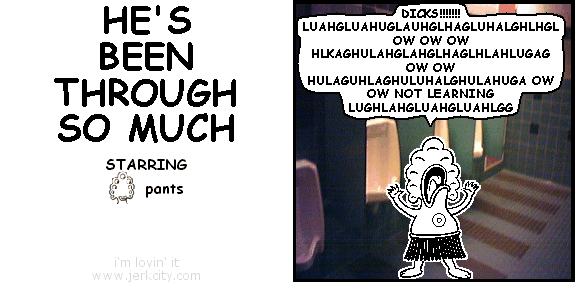
Build Date: Tue Sep 9 13:40:16 2025 UTC
Bill Gates is such an idiot he had initials burned into my ass.
-- rotten elf
| Interview with Seth Shostak —Reported 2001-12-21 19:42 by Siduri | |||
|
Spock "I've always liked Spock."
Mark: Do you have anything to say about Spock, by the way? Seth: Got anything to say about Spock? Siduri: We like Spock. Seth: Oh. Well, he is emotionless, as the aliens often are. And I've never understood this because emotions are of course essential to biological beings. Without emotions you're not motivated to do much; I don't know how he survives. But aside from that I've always liked Spock—there's something appealing about him. And Leonard Nimoy actually still has contacts with this institute. I shouldn't say "still"; he has contacts with this institute. And he's done a lot of pro bono work for us. He's come up here a couple times. Siduri: We were admiring your autographed photo out there. Seth: Oh, yeah, of Leonard? Lenny? He's a very nice guy, actually, and I've got to say that not everybody in Hollywood with his level of recognition is a nice guy. Leonard Nimoy is, he really is. I'm very positive about Leonard Nimoy. I like the character too, but I have to tell you that when I was in grad school I wrote a letter to Gene Roddenberry, saying "look, your stories are okay, I mean it's a good show and all that, but really, there are all these very small technical details that are just wrong. Scientifically wrong. And it would be really easy to fix them without affecting the storylines at all, and for the one percent of the audience that cares about that kind of stuff, at least you'd have this improvement in your reputation. So if you're willing to pay my bus fare over to Burbank once every two weeks, I'll come over and redline the scripts." And I was living down in the LA area, so bus fare to Burbank would cost a couple bucks. He wrote back. I think I've still got a hold of it. Siduri: Yeah? What did he say? Seth: He said thanks, but no thanks. He said, "Look, we've already got somebody doing this: the RAND Corporation." The RAND Corporation's this Defense think-tank over in Santa Monica. I remember my roommate looking over the letter, and he says, "The RAND Corporation is responsible for their science?" He says, "Son, we're building a bomb shelter." Siduri: So I'll just blow through the rest of these question that I have from people, if you don't mind. Seth: As you would. Siduri: Okay. Seth: I wouldn't want to have to listen to these tapes. Siduri: I think we might have gone through "do you think it's gonna be like Star Trek one day." Seth: Yeah, with the Galactic Federation? There are problems with that, unless you can beat the speed of light. But of course in Star Trek they can. Sid [quoting Paul]: "With the coming creation of the Allen telescope array, along with the expansion to include the possibility of the laser pulse as a form of interstellar communication..." Seth: This is a propellerhead question, right? Siduri: No. [resumes reading] "...it is quite clear that our search for intelligent extraterrestrial life is reaching a new plateau. SETI is a project with far-reaching appeal, and you will almost certainly obtain continued private financial backing from wealthy enthusiasts. Bearing this in mind, and assuming that the search doesn't turn up any needles in the coming decades, what do you foresee in SETI's future?" Seth: If we don't...? Siduri: If you don't come up with anything... Seth: In the coming decades...? Siduri: ...in the coming decades, what'll you do? Seth: Yes. I would be surprised, to be honest—people often ask me "when you gonna hear something," and you get all kinds of answers, and usually they're small numbers. But the Allen telescope array, which is this new array that we're building—[points to a photo] sort of looks like that but not really: much smaller antennas, 20-foot diameter antennas—will be able to check out by the year 2020 millions of stars, millions. And that's much, much more than we've done so far. We've checked out, like, 500 stars so far. So this would be millions of stars. I honestly think that's kind of the order of magnitude of sample size that you need in order to find something. How many needles are in there, anyhow? Nobody knows, but if you take sort of conservative estimates, then if you can check out a couple of million sun-like stars, then you have a chance. A good chance. So if you don't hit anything in the next couple of decades, well, one, do you get discouraged, or two, if you don't get discouraged, what do you do? I doubt that I would get discouraged in a couple of decades. I mean, I might not even be here, but I don't think that SETI would get discouraged in a couple of decades. I think if you didn't find anything in a hundred years, well, you'd get discouraged. Siduri: Might give up at that point? Seth: Well, I don't know. I don't think that I personally would be convinced, assuming I were alive, that the aliens weren't out there. I think I would be convinced that there's some really important physics we're missing here. That somehow we're barking up the wrong tree—there's some assumption that's really wrong. It would still be very hard for me to believe that we're it—it's just that that's personal. But in twenty years I don't think that either of those would come into play. You'd say, "okay, we've got enough of these." But in fact, in another twenty years, there should be a much bigger telescope called the Square Kilometer Array [http://www.nfra.nl/skai/], which the Europeans and the Americans are considering building, which is something like the Allen Telescope Array but ten times bigger on both sides, so it's really a hundred times as large. And it'll be very useful for radio astronomers; it'll be enormously sensitive. It'll be a kilometer in size. But something like that could be used to have separate receivers on there that would just be dedicated to SETI. And that would be a hundred times more sensitive, so you could see the same signal ten times farther out into space. That means you could check out not a million stars, but a billion stars. And if you check out a billion stars and still don't see anything, that means that there are only—there can be no more than maybe fifty broadcasting civilizations in the entire galaxy. Assuming they're all surrounding sunlike stars. So that's such a small number that—I find that a hard number to believe, so—I think that's the next step, you build a much bigger... Siduri: So you start thinking that maybe radio...? Seth: I think radio's still a good way to go. But in this period there'll be lots of other kinds of experiments—Doppler—but they'll have also checked out, I suspect, millions of stars by then, because with optical it's actually easier to check out a lot of stars. So I think what you're going to see in the next couple decades is orders of magnitude increase in the number of star systems that have been checked out. TCS: I'm curious about—does radio observation have the same sort of atmospheric problems that visual observation does? Seth: No, not at the frequencies used for SETI. The frequencies we're observing at are the microwave frequencies. The atmosphere's completely transparent up to 50 GHz or something. TCS: So having orbiting or transatmospheric telescopes is not gonna...? Seth: No, no, that doesn't win you, doesn't help you, in fact it makes things worse because it gets you up there with all the satellites—you've got more interference. Yeah, that's a big problem for SETI, actually: long before a hundred years have gone by, they're probably not going to be able to do radio SETI on the Earth, because of all the interference. Have to move it to the back side of the moon. |
|||
Next page: Getting into the Biz
T O P S T O R I E S
California Glory Hole attracts huge crowds
A glory hole at Napa's Lake Berryessa is drawing huge crowds. According to Chris Lee, the general manager for the Solano County Water Agency, the glory hole hasn't been active since 2019, and only restarted operations on Feb 4. (More...)
Republican State Senator busted after soliciting a teenage girl
Republican State Senator Justin Eichorn of Minnesota was arrested for soliciting a teen girl on Monday just hours after he introduced a bill proposing "Trump derangement syndrome" (TDS) as a form of mental illness. (More...)
Parents claim measles is not that bad after having only one child die
The parents of a Texas girl who died from the measles are defending their decision not to vaccinate their daughter. "She says they would still say 'Don't do the shots,'" an unidentified translator for the parents said. "They think it’s not as bad as the media is making it out to be." (More...)
Delusional rich man tries to fire town staff
"I'm mayor now" said write-in mayoral candidate and founder of Pirate’s Booty Snacks Robert Ehrlich after losing the election for Mayor of Sea Cliff, NY. Then he tried to take over the Village Hall and fire everyone. (More...)
Musk claims Xitter security is staffed by idiots
Earlier this month Xitter experienced a massive outage. In an interview, Musk told Fox Business that he believes the attack came from "IP addresses originating in the Ukraine area." (More...)
The Future Ain't What It Used To Be
Ideas have taken horrifying shape and rooted into our modern reality. (More...)
C L A S S I C P I G D O G
Ratsnatcher gets HOT HOT HOT in this classic road tale that looks at the steamy underworld of Bay Area Linux advocacy. Loosen your collar for this one! (More...)
Yet another delicious SPOCKTAIL from the SMRL Beverage Science Labs! Check under the cap for your chance to win thousands of fabulous prizes! (More...)
Patient Joab's scientifick editorial discusses aspect of the space-time-beer continuum never before processed by sub-bush-robot minds!!! Too fabulantastic to contempulate! (More...)
Eavesdropping on Geeks: 'Star Trek: Discovery' vs 'The Orville'
If you broke into Pigdog's top sekrit headquarters, spying on their mysterious mix of weird science and old-skool geekiness, you'd overhear this conversation: (More...)
Paranoid Strippers & Psychotic Crack Dealers (Tales of Christmas Eve)
Christmas day, for the last 17 or so years has bored me. I find that the real fun and excitement always takes place on Christmas Eve. Every other year, it's the excitement of the metaphorical hunt instead of the kill. Otherwise, it's just plain bad craziness. (More...)
Canadians Not So Different After All
Nobody wants to be prejudiced. But sometimes you can be biased and not even realize it. I think many Americans are biased in this way against Canadians. I never really stopped to think about it, but I myself used to be this way. I guess I thought that Canadians were "stuck-up" — you know, smarter and better cultured than us. But then I got educated about Canadia. (More...)



